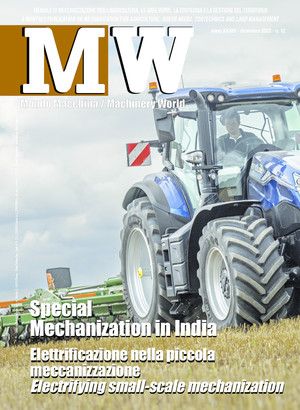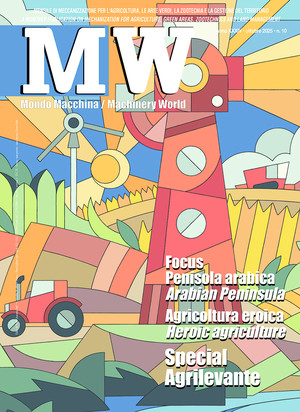Search for Articles
You are looking for tag: Bioeconomy
Bioeconomy
Bioeconomy in Abruzzo: the success of the GESTA project
The project, funded by the Ministry of Agriculture and aimed at establishing an association for the active management of Abruzzo's forest heritage, ended last December. Activities carried out as part of the initiative
Special
The ITABIA initiatives championing best practices
Sustainability and the circular economy can provide a response to the challenges posed by the climate emergency and the need to reduce the environmental impact of human activities. These are the central themes of ITABIA’s initiatives during the Agrilevante exhibition in Bari
Bioeconomy
Biomass and bioenergy: the new agro-industry frontier
FederUnacoma and ITABIA experts have organized a seminar on the opportunities offered by the use of biomass energy. Bioenergy is in full development but further growth will require
Bioeconomy
The Industrial and employment advantages of the energy transition
In order to achieve the objectives of the Green Deal, EUR 320 billion in Italy per year will be needed until 2030. But investments in renewables are not just a cost item, they also have important economic implications with an overall added value that will reach EUR 360 billion in 2030
Special
EIMA Energy: more space for the bioeconomy
Last year, the bioeconomy provided qualified employment to approximately 2 million Italians, generating a turnover of EUR 437.5 billion. EIMA Energy 2024 fits into this framework, showcasing all the technologies needed for the handling and treating of agricultural and forestry biomass
Bioeconomy
Capraia Smart Island 2024
Capraia Smart Island is a laboratory of "green" ideas accredited far beyond the borders of the island. On the terraces of Capraia and similar areas mechanisation can provide technological solutions with which to facilitate cultivation operations. EIMA International will give voice to the agromechanical needs of these fascinating territories
Bioeconomy
Digestate, a precious resource for the production of green fertilisers
The eighth edition of the Biogas Italy event reiterated the importance of digestate for carbon neutral agriculture. Biogas plants contribute not only to energy generation but also to the production of fertilisers, derived from digestate
Bioeconomy
Sustainable agriculture, the successes of the Branches project
The Final Conference of the BRANCHES Project, hosted at FAO headquarters in Rome, presented the results of the European project funded by the Horizon 2020 programme to facilitate the development of the bioeconomy. BRANCHES as a multiplier of good practices
Bioeconomy
Forest management: the relaunch of mechanisation
Innovating the machinery of forestry operators is essential for active forest management. The Abruzzo-based GESTA project, financed by MASAF, distinguishes itself for combining new technologies with some traditional local practices
Bioeconomy
RuralBioUp, a European project to promote bioeconomy
The project was launched in October 2022 to support the growth of bioeconomy and related supply chains, involving twelve partners in nine different countries. Italy, where three of the nine regional hubs under the project will be activated, has been assigned a leading role
Bioeconomy
BRANCHES survey: energy independence linked to bioenergy
Even if energy costs returned close to pre-crisis levels, the economic shock was very severe and highlighted the role of the bioeconomy in supporting energy independence, local resources and communities with respect to this emergency. All this emerges clearly from a survey conducted for the BRANCHES project
Bioeconomy
Energy diversification, biomass heating is strategic
The military conflict between Russia and Ukraine has raised the question of diversification of energy supply sources with particular urgency. With this view, renewables are called upon to play a strategic role, as demonstrated by the story of the biomass district heating plant in the South Tyrolean municipality of Rasun-Anterselva, included as an example of good practicein the EU project "BRANCHES"
Bioeconomy
Biomass, a resource to reduce energetic dependence
Against the dramatic backdrop of the conflict between Russia and Ukraine, we must not lose sight of the strategy to decarbonise Europe. At the invitation of the FREE (Renewable Sources and Energy Efficiency) Coordination, a group of experts met to discuss the italian energy model
Bioeconomy
Supplies alarm: the agro-energetic alternative
The conflict between Russia and Ukraine is taking its toll in human, economic and social terms. In addition to the direct consequences of the war, there are also the consequences of rising agri-food prices caused by soaring fuel and fertiliser prices. Circular economy and renewable sources are key to combating food insecurity and energy prices
Bioeconomy
Bioenergy and ecological transition
Bioenergy should be recognised as having the capacity to reduce energy dependence by replacing fossil fuels with those derived from residual biomass, which is useful in terms of circularity. Short supply chains for the supply and exploitation (energy and/or industrial) of biomass stimulate the local economy, especially for mountain and rural areas, thanks to the national industry that expresses excellence in the manufacture of machinery and the provision of services
Bioeconomy
GREENITALY 2017, x ray of a growing sector
A GreenItaly 2017 survey on the state of the green economy in Italy was made public in Rome. The document shows the remarkable growth of the sector in the country which extends from renewable energy sources, green recycling in all the Made in Italy areas and the substantial fallout for job creation
Bioeconomy challenges climate change
During the recent COP 23, special attention was paid to bioeconomy as a key strategy to fight global warming. High-level ministers and representatives of member – countries of the "Biofuture Platform" – also joined by Italy and India – have signed a declaration of intent to support the sustainable development of bioproducts and bioenergy. Investing in renewable sources is the challenge for the decarbonization of future economy
Bioeconomy
ENABLING, an European project for Green Economy
From next December, FederUnacoma, in partnership with Itabia – Italian Biomass Association – will coordinate
an European project aimed at promoting the use of natural and renewable raw materials for a zeroimpact
industry. In this field, a significant synergy between several production sectors, the world of research and political bodies, will make a determined push to succeed in innovative markets
Environment
Green Economy: the role of industry in combating climate change
Strategies for reducing greenhouse gases include various types of interventions, including the application of technologies that optimize production processes, significantly reducing energy consumption. Some specific surveys show that the "French model" proves the most efficient in the reduction of energy consumption, but significant results have also been achieved by certain Italian industrial sectors. Overall, Europe has invested heavily to support an increased use of renewable energies







